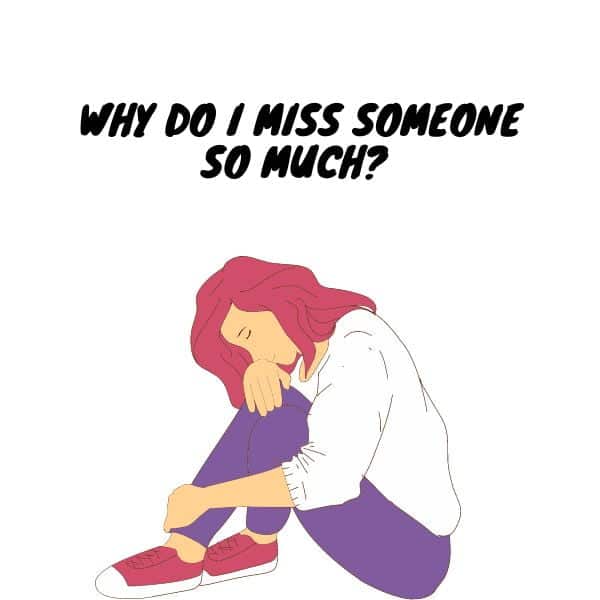Opening Thoughts
Everyone at one point in their life has had to miss someone. Whether it is a partner, friend, or a beloved family member this sensation of missing someone could become incredibly passionate and dreams consuming. But why do we miss someone, what does that mean? What does ‘missing someone’ imply and what are the effects of missing someone really bad? In this post we’ll try to analyze this feeling in detail, the reasons for missing people, and how to deal with it.
The Psychology of Missing Someone

When you say you miss a person it’s beyond just being an emotional outbreak. It is inborn in our neurophysiology and psychobiology.
Attachment Theory
Social attachment theory, proposed by John Bowlby in the nineteen sixties, talks about why human beings develop strong affinities. To have a safe long-lasting and fulfilling life, people are equipped with the urge to be connected to other people. From childhood, we must depend on someone to fulfill our needs, and this attachment pattern determines human interaction in their social life. When these attachments are disrupted, we feel an emotion we now call longing or a sense of missing someone.
Biochemical Factors
The feeling of having someone special missing in your surroundings is associated with hormones such as oxytocin and dopamine.
- Oxytocin: Sometimes also known as the “love hormone,” oxytocin is involved in the manifestation of trust and bonding. If you are fond of the person you are with, then your oxytocin level will rise, and thus will the happiness. When that person is gone, oxytocin levels recede to normal, and we get the feeling of loneliness that results from missing our loved ones.
- Dopamine: This neurotransmitter is linked to basically everything enjoyable in life. Staying with those you love triggers a release of dopamine, causing you to feel happy. Without it, when they are no longer around or showing any interest in you, you just feel down and the pining is worse.
Memory and Nostalgia
The emotions of missing an individual are preconditioned by memories. When one shares the experiences, the brain tends to reiterate the same, and most of the time only the positive events are remembered. By doing so, this lens of temporality gives us the longings for the past and amplifies the feeling of missing the other.
Why Do We Miss Someone So Much?

Several factors contribute to why we miss people so deeply. Here are some psychological reasons:
- Emotional Dependence: When you have physical and emotional intimacy, the lack of that person is felt like a hole or vacuum.
- Unresolved Emotions: Missing someone could be in the form of having left mid-sentence or thoughts, or feelings that you never got to tell them.
- Triggers in Everyday Life: Lands, tunes, fragrances, or just products of everyday use can bring up feelings and cravings for a person.
- Social Media Influence: Captive audience for today’s technology associate, social media enables us to find and stay connected with the ones dear to us, yet the feeling of the absence maybe even stronger. If we see their posts or pictures then we tend to remember them and it does not help in healing the pain of losing such a person.
The Emotional Effects of Missing Someone
The psychology of missing someone reveals that this emotion can affect us both mentally and physically.
- Stress and Anxiety: Cravings can also cause anxiety, and if one misses a particular person, stress is bound to interfere with that person’s morale, causing emotional fatigue.
- Physical Symptoms: The stress symptoms may involve headache, change in appetite, sleeping problems, and low immune system.
- Mood Swings: This kind of feeling has the potential of making you have high expectations of getting back together and at other times have low emotions of getting back together.
Coping with the Feeling of Missing Someone

It is however important to note that there are ways of avoiding overwhelm when you are missing someone and how to progress to the next step. Here are some practical tips:
1. Practice Mindfulness
Mindfulness enables a person to focus her /his mind on the present period without thinking of the previous one or periods that were previous to the one that the person is in at the moment. This is because when you appreciate the things you have and the people around you it is harder to miss someone.
2. Stay Active
Exercise helps to produce endorphins in the body, and these chemicals will make you happy while giving you something to do to stop you from constantly thinking about the person you miss.
3. Journal Your Thoughts
There is relief in the form of expressing them in writing and at the same time, they offer some form of illuminating the situation. Writing your thoughts in a journal allows you to think about why you need someone or desire they were around; you can discover what that means to you.
4. Connect with Others
This is good because the feeling of loneliness which often accompanies such feelings can be counteracted by reaching out to friends and family. In addition, new connections allow the abovementioned feeling to be virtually diminished because the building of new connections significantly weakens the impact of missing someone.
5. Limit Social Media Exposure
In case you realize that social media makes your condition worse, it is high time you consider deleting your account. Do not frequently look for updates or wish to return to the previous photos, they rather exacerbate the feeling.
6. Reflect and Redirect
Try and ask yourself why you think you miss this person a lot. Is it love, routine, or memory? Learning about the factors might enable you to refocus on your personal development and recovery.
When You Miss Someone So Much: Seeking Closure
At other times the desire to see a person is just the body telling you that it needs closure. In this case, if it’s possible one should try to go to the individual and tell him/her how you feel. A beautiful talk can help make all the fog clear and even make things more secure between you two. If reincorporation is not possible, then acceptance should be the goal and it is time to do its work.
Final Thoughts
The ‘’Feeling of missing someone’’ is worth proving and showing how powerful the human connection is. It is understandable to want and miss people you have been close to but one must take care of their well-being. It should be grasped that it is weird when individuals miss someone too much, and the state quickly fades over time if sufficient efforts are applied.
No matter if you ask yourself the question such as Why do I miss someone so much? Or addressing the psychological impact of Institutionally conditioned neglect or missing someone badly, there are others like you. Always remember that the process of recovery is a beautiful one and is completely okay to see a therapist if needed. You deserve happiness and peace in your life as much as anyone else does..

